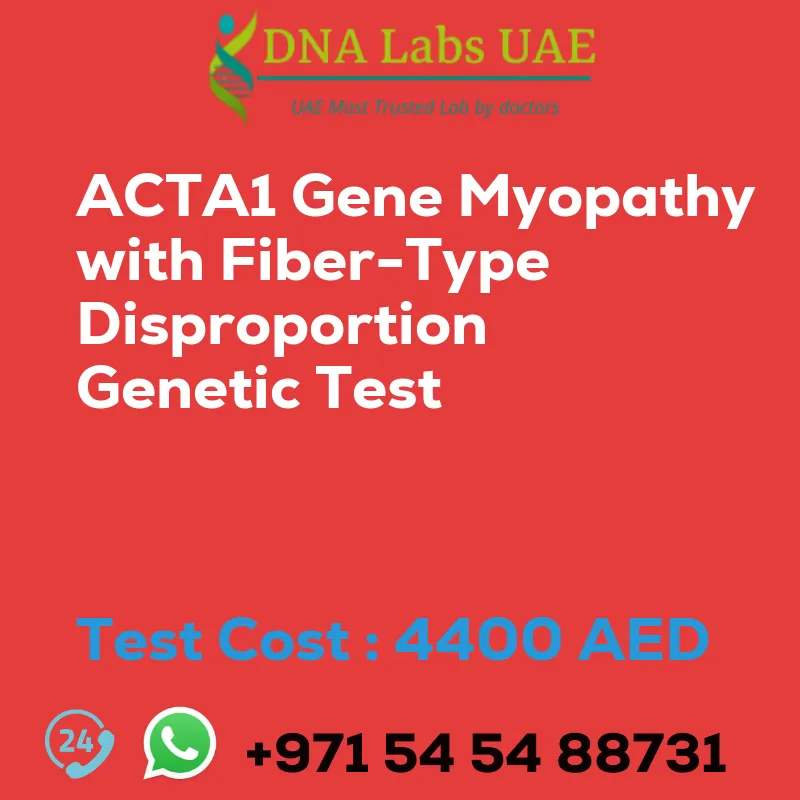ACTA1 Gene Myopathy with fiber-type disproportion Genetic Test
Genetic testing is a valuable tool in diagnosing and understanding rare genetic disorders such as ACTA1 gene myopathy with fiber-type disproportion. This disorder affects skeletal muscle function and is caused by mutations in the ACTA1 gene.
Test Details
The ACTA1 Gene Myopathy with fiber-type disproportion Genetic Test utilizes Next-Generation Sequencing (NGS) technology to identify mutations in the ACTA1 gene. NGS is a high-throughput sequencing method that can simultaneously sequence multiple genes or even the entire genome. This allows for the detection of various genetic mutations associated with different disorders, including ACTA1 gene myopathy with fiber-type disproportion.
To perform the test, a DNA sample is required. This can be obtained through a blood sample or a cheek swab. The DNA is then sequenced using NGS technology to identify any mutations in the ACTA1 gene.
The test results can confirm a diagnosis of ACTA1 gene myopathy with fiber-type disproportion and provide information about the specific genetic mutation involved. This information is crucial in guiding treatment decisions and understanding the inheritance pattern of the disorder.
Test Components and Price
The ACTA1 Gene Myopathy with fiber-type disproportion Genetic Test costs AED 4400.0. The test is conducted in the Genetics department of DNA Labs UAE.
Sample Condition and Report Delivery
The DNA sample required for the test can be obtained from blood. The report delivery time is approximately 3 to 4 weeks.
Test Type and Doctor
The ACTA1 Gene Myopathy with fiber-type disproportion Genetic Test falls under the category of Neurological Disorders. It is recommended to consult with a Neurologist for this test.
Pre Test Information
Before undergoing the ACTA1 Gene Myopathy with fiber-type disproportion Genetic Test, it is important to provide the clinical history of the patient. Additionally, a Genetic Counselling session may be conducted to draw a pedigree chart of family members affected by ACTA1 Gene Myopathy with fiber-type disproportion. This information helps in understanding the inheritance pattern and assessing the risk for other family members.
Benefits and Implications
Genetic testing for ACTA1 gene myopathy with fiber-type disproportion can provide a definitive diagnosis and guide treatment decisions. It is particularly useful for family members of affected individuals, as it can determine if they are carriers of the genetic mutation and at risk of passing it on to their children.
However, it is important to consult with a healthcare professional or genetic counselor before undergoing genetic testing. They can provide guidance on the benefits, limitations, and potential implications of the test results. Each individual’s situation is unique, and a healthcare professional can help interpret the results in the context of their specific circumstances.
| Test Name | ACTA1 Gene Myopathy with fiber-type disproportion Genetic Test |
|---|---|
| Components | |
| Price | 4400.0 AED |
| Sample Condition | Blood |
| Report Delivery | 3 to 4 Weeks |
| Method | NGS Technology |
| Test type | Neurological Disorders |
| Doctor | Neurologist |
| Test Department: | Genetics |
| Pre Test Information | Clinical History of Patient who is going for ACTA1 Gene Myopathy with fiber-type disproportion NGS Genetic DNA Test A Genetic Counselling session to draw a pedigree chart of family members affected with ACTA1 Gene Myopathy with fiber-type disproportion |
| Test Details |
ACTA1 gene myopathy with fiber-type disproportion is a rare genetic disorder that affects skeletal muscle function. It is caused by mutations in the ACTA1 gene, which provides instructions for making a protein called skeletal muscle alpha-actin. A genetic test using Next-Generation Sequencing (NGS) can be used to identify mutations in the ACTA1 gene. NGS is a high-throughput sequencing technology that allows for the simultaneous sequencing of multiple genes or even the entire genome. This enables the detection of various genetic mutations associated with different disorders, including ACTA1 gene myopathy with fiber-type disproportion. The NGS genetic test involves obtaining a DNA sample, typically through a blood sample or cheek swab, from the individual being tested. The DNA is then sequenced using NGS technology to identify any mutations in the ACTA1 gene. The results of the test can help confirm a diagnosis of ACTA1 gene myopathy with fiber-type disproportion and provide information about the specific genetic mutation involved. Genetic testing can be useful for individuals suspected of having ACTA1 gene myopathy with fiber-type disproportion, as it can provide a definitive diagnosis and help guide treatment decisions. It can also be helpful for family members of affected individuals, as it can determine if they are carriers of the genetic mutation and at risk of passing it on to their children. It is important to consult with a healthcare professional or genetic counselor before undergoing genetic testing to understand the benefits, limitations, and potential implications of the test results. They can provide guidance on the appropriateness of genetic testing and help interpret the results in the context of an individual’s specific situation. |








